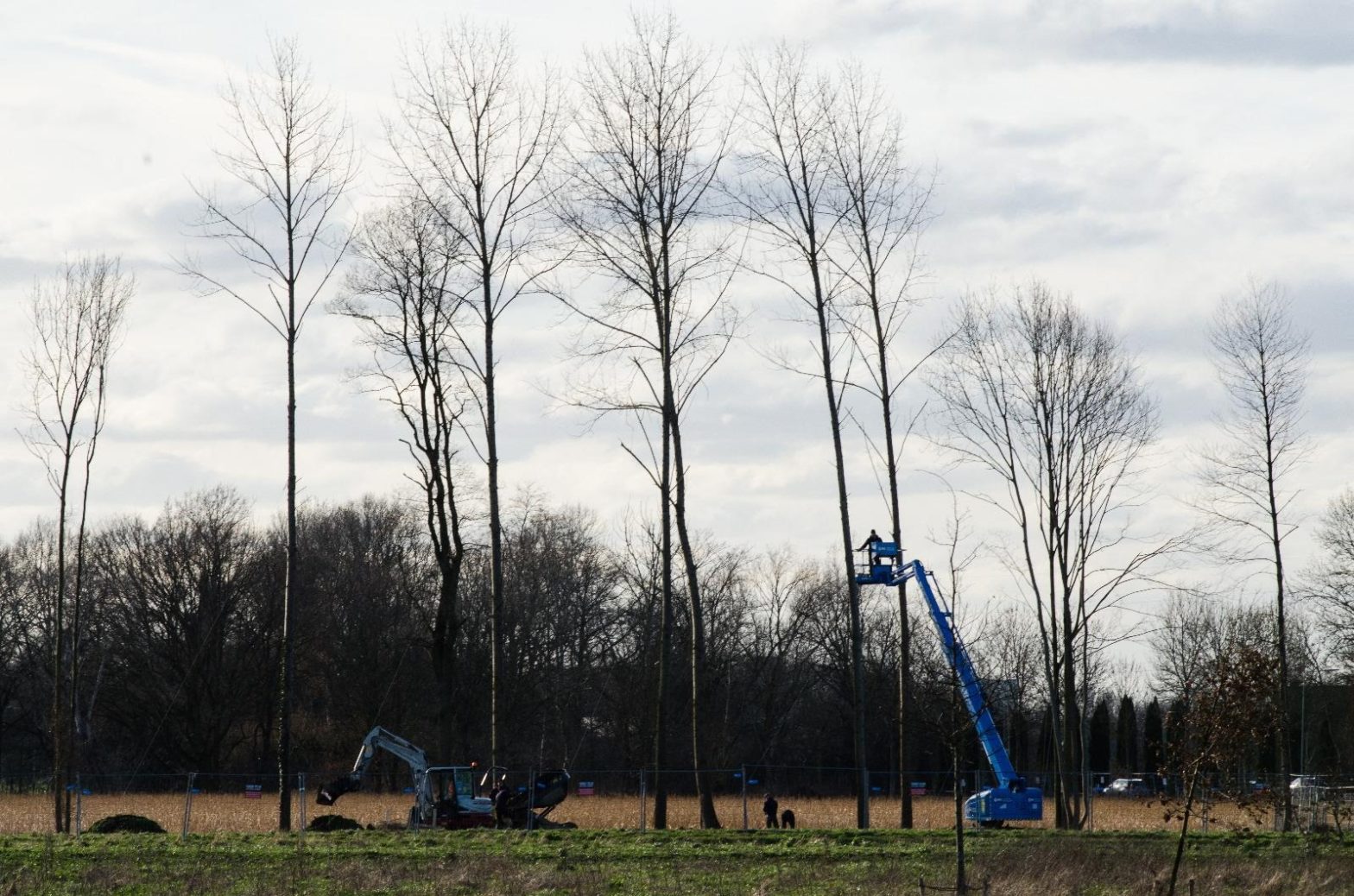The Sterrebos has been cut down. One of the few ancient pieces of forest with enormous biodiversity has been sacrificed for an extra factory hall of VDL Nedcar, one of the many companies of the billionaire family van der Leegte. The pater familias, Wim van der Leegte, has been in the top 10 of the 500 wealthiest Dutch citizens for years with a fortune of 2.1 billion. With 104 companies in 20 countries, this family knows better than anyone how to pass on the risks and negative consequences of their business operations to others: employees, local residents, the environment. VDL can use the best and most expensive lawyers, can buy out objectors, and has a PR department that knows how to greenwash things. Of course, a big company like VDL can count on a government that defends its interests with all its might.
In this piece we look back at the struggle for the Sterrebos and show how citizens and other stakeholders are prevented from opposing VDL. Not only have we lost a forest, but we as a society lose the opportunity to build a sustainable future in a fair and equal way. As long as multinationals call the shots, there will only be losers in the long run.
Everything for profit
VDL Nedcar has a curious business model. The company does not produce its own cars but is dependent on clients, who come and go. There have already been several threats to close the company and move production to Central or Eastern Europe. In 2013, Mitsubishi left, and employees were laid off with the promise to be able to return after a year and a half. Since the current contract with BMW (2014 – 2023) will soon end, workers again do not know where they stand.
VDL claims that the construction of a new factory hall, at the expense of the Sterrebos, is necessary to guarantee employment and that the forest protectors therefore threatened to ensure that 4,200 families would soon have empty plates. But of course it is not like that: to begin with, we cannot stress often enough that the possible deal with Rivian is still extremely uncertain. The chances that soon there will be no forest and no jobs are very high. In addition, a deal with Rivian will again be a temporary story, just like with BMW and Mitsubishi in the past. So the job insecurity remains and a cut down forest never comes back. It is also important to keep emphasizing that there is no structural employment problem in the Netherlands at the moment. The economy is growing enormously and there are far too few workers to be found in this aging part of Limburg. Eastern Europeans are hired with precarious, flexible contracts only to be fired just as easily.
Sustainable employment requires something quite different than the premature felling of forests for temporary customers. But of course, it was convenient for VDL to tell employees that their job insecurity was all due to the “tree-huggers.” Workers and environmental activists were played off against each other while the billionaires got away with the profits.
FNV board member Ron Peters flat out talked the board into saying, “Building elsewhere is capital destruction. We will not participate in that.” It is clear that within the union there is still a great deal of support for maintaining capitalist business practices, and that environmental concerns are neglected.
Alternatives not considered
VDL maintains that a second production hall is necessary to attract new customers and that the only possible location for that hall is at the Sterrebos site. The Province of Limburg supports VDL in this.
But as we were told by a former manager, VDL could just as easily expand the factory on its own site without cutting down the Sterrebos. The second factory hall could have simply been turned a quarter turn. The only drawback would have been that the hall would have been right in front of Wolfrath Castle, which as it happens is owned by VDL.
VDL bought Castle Wolfrath in 2015, and now operates it as a luxury hotel and conference center. As befits real castle owners, VDL will of course ensure that the view from the castle is not marred by an ugly factory hall, which is why they’ll keep a small line of trees as an aesthetic screen. They clearly have their priorities straight.
Moreover, there were a number of other alternatives that could have saved the forest and enabled the car factory to expand. These alternatives might have been slightly less efficient or slightly more expensive. And of course it would also have been possible to convert the current hall. In that case, production would have stopped for a long time, but this also happened in 2013.
The obvious problem here is that nature conservation is not seen as a relevant factor when it comes to (the appearance of) economic development. If the province refused to fell the forest, things could be different. But they aren’t. We live in a time where a major mind shift is needed. The leadership for this – as always with large, necessary social changes – does not come from the incumbent power structures, but from small grassroots groups. Our forest protectors stand for a bigger vision, a more important story, and are ridiculed and fined for it, while the powerful continue to increase inequality and destroy nature with impunity.
The legal process, co-optation and public participation
For several months, hopes were pinned on the case at the Council of State by foundation De Groene Sporenwolf (DGS) and bat foundation SEVON. De Groene Sporenwolf is a foundation, run by a few residents of Nieuwstadt (currently two), which promotes the interests of the village and is therefore not, as some media claimed, an environmental organization.
On January 13 the hearing was at the Council of State. DGS had worked for days on their defense, but saw their chances dwindle against the army of top lawyers and advisors of VDL, who attacked them mainly on their statutes. SEVON‘s objection, which did not have its own lawyer, was declared inadmissible because the foundation had not paid the necessary costs.
To the surprise of the activists and many others, DGS had been quietly negotiating with the van der Leegte family for weeks about a compromise. Negotiations had already started before the hearing at the RvS, and the final deal – according to DGS – had even been reached at the time the forest protectors went into the trees, but was only announced on February 8.
DGS writes that when the negotiations became known, it “received a huge stream of criticism from Red het Sterrebos and affiliated groups.” However, Red het Sterrebos did not speak ill of DGS even until after the eviction. We aimed our arrows at VDL Nedcar who “clearly […] is pulling out all the stops to quiet the objectors and clear the forest as soon as possible.” We therefore wrote: “We are counting on the Groene Sporenwolf to keep its back straight and await the ruling of the Council of State.”
This whole course of events is a clear example of co-optation. As animal rights organization Ongehoord tweeted: “Classic game at Red het Sterrebos: The car factory makes a weak compromise with moderate NGO to then attack Red het Sterrebos. Compare this to the animal industry, the Animal Welfare and animal activists. NGOs are basically doing PR work for corporations”.
It also remains to be seen whether the half-hearted agreements between DGS and VDL will actually be implemented: if farmers do not voluntarily give in, no land will become available for the green fund which has been erected. The 55 poplars, oaks, ash trees and maples that were relocated have yet to survive. No hiker wants to walk across a newly constructed bridge over industrial terrain and highways. And dealing with noise pollution has already been promised once before to Nieuwstadt, but it has not been realized.
We have said before about compensatory planting and replanting: this forest cannot be replaced.
Compelling reasons
In the morning of February 8 VDL started the felling of the Sterrebos. The last forest protectors were still high up in the old oak tree, deer ran in panic against the hermetically sealed fences to flee from the chainsaws that crushed the beautiful 200 year old oaks in a matter of minutes.
The felling had to happen now, and was virtually completed within a few days.
VDL itself writes on its website: “Due to the occupation of our trees, we are forced to start the felling earlier. In order to maintain public order and safety, and to prevent further disruption thereof, we have therefore expedited the tree felling.” This makes it seem as if the forest protectors had caused the forest to be cut down. The reality, of course, is different: VDL wanted to start cutting already at the end of 2021, in order to be able to bring in a new customer – Rivian – according to its own words. The judge put a stop to that in October and ruled that the felling with irreversible consequences could not take place as long as the expansion was not yet final. In February 2022, it was still doubtful whether Rivian would come, but with the deal with DGS in hand, VDL is sure to wipe its street clean on the backs of brave forest protectors.
Breeding tawny owls
Except for the tree activists, after the deal with DGS was closed nothing stood in the way of razing the Sterrebos to the ground in a matter of days. At the very last moment a breeding pair of tawny owls seemed to offer hope. The tawny owls had been spotted by the forest protectors, and we therefore filed a complaint with the Province on February 11. However, VDL, again with the support of the province, proceeded cutting at breakneck speed behind closed fences. What a coincidence that VDL, after the complaint was handed in, indicated that they had spotted the tawny owl before and had agreed with the Province to keep a distance of 75 meters. Once again we see how the legislation is not sufficient. What use is a grove with a radius of 75 meters to this family of tawny owls, next to which a factory hall is being built?
The very hungry caterpillar
Soon it will turn out that the forest has been cut down for nothing, workers are once again insecure, and Rivian SUVs do not contribute to climate justice. The Van der Leegte family has shown its true nature: this very hungry caterpillar cares about itself first. As Willem van de Leegte himself says: “The family is good for the company, but the company is also good for the family”.

